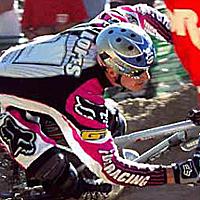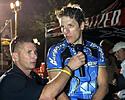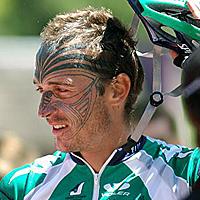Extreme riding feature, October 26, 2005
Beat you to the bottom of the hill
Red Bull is known worldwide for their sporting events that go 'beyond the boundaries' to create something that is tailored to suit the 'extreme' audience. On November 5 their latest event, the Red Bull Road Rage, will pit riders against each other on a wickedly steep and technical piece of road in Tuna Canyon, California, to see who can make it down the hill fastest. It's a basic premise for a race, but one that organisers believe will be a hit. Cyclingnews' Les Clarke finds out about this latest offering for thrillseeking riders.

|
The brainchild of the event, Jon Mesko, had the idea for the event about four years ago. "I moved from Michigan, which is really flat, to California, and while racing I soon found out you could put like three minutes into a guy just by descending better than him. That got me thinking about having a race to see who could go down the hill fastest." But an event involving high speeds and the potential for some nasty accidents is never going to be easy to organise, hence the period of time involved between the formulation of Mesko's idea and it actually coming to fruition. "I always wanted to have a downhill event," said Mesko, "But I wanted to do it right, so I waited for the right time." Mesko had the drive to make it happen, but needed the means to make it happen - enter stage right, Red Bull.
"My first move was to contact Red Bull," said Mesko. "They've got the marketing pull and the vision to make an event like that happen. Something like this is too risky for most companies, but Red Bull is innovative with their events, so I pitched it to them." The company was interested, but at the time their commitments were elsewhere, and resources couldn't be directed towards Mesko's particular event. The company organises events such as the Red Bull Rampage, Divide and Conquer and Giants of Rio. Some of these are multisport events, others dedicated to one particular sport. They have a history supporting skateboarding, mountain biking and BMX, and communications manager Paul Malina supports Mesko's belief that the company looks to be innovative and daring, saying, "we look to support particular sports as soon as they enter the market. We support mountain biking, skateboarding and BMX, and are looking to develop new events every few years." In light of this strategy, the Road Rage event tied in perfectly with company plans.

|
But according to both Mesko and Malina, the road racing scene is traditional, so an event involving new equipment, high levels of risk and a different concept is daunting for most teams, riders and companies involved in road racing. For example, Mesko works for Giant Bicycles, and says they were cautious at first but got behind it gradually, and now "they are excited about the concept. It's on the edge, it's cool, and it offers new avenues for the company to pursue." Which is how Mesko sees the entire event developing. "No one really wants to try the first model, but when others have used it and it's good, they'll come and be a part of it."

|
In January this year Red Bull gave the go-ahead to begin organising the event, so the next task on Mesko's agenda was to organise a suitable piece of road for the race. There was a lot to consider; the road would have to be shut off from traffic, which meant it had to be remote enough not to disturb major routes, and of course it had to be a testing descent suitable for some of the world's best descenders. A 'hidden' piece of road in La Tuna Canyon, approximately 14 miles from Los Angeles is unknown to most people because it's a secret road built by the military to transport goods away from main roads. It's a twisty, one-way piece of road that can easily be shut down for a race. The biggest concern is safety - and before we spoke with Mesko he'd been driving the course organising barriers and padding for the course.
"Safety would constitute about 30-40 per cent of our budget for the event," said Mesko. "Lots of padding and barriers; there are some blind corners that drop down a sheer cliff, so we have to put barriers on them. We pretty much had to take our budget for safety and double it." Mesko says that arranging to shut down the road was relatively easy due to the fact that it's substantially easier to close it off - being one-way and having no homes along the route were big factors.
That considered, the racing isn't going to be open for spectator viewing, but it won't stop the folk at Red Bull putting on a party or two over the weekend. "We look to make events athletes want to come to - we'll put the guys up in hotels, there'll be parties and a bunch of cool stuff. The mountain bike guys know how much fun Red Bull events are, and they'll make the time to attend." This is reflected in the rider list, with bikers such as Eric Carter, Brian Lopes and Cedric Gracia riding - they are familiar with the events Red Bull organises, and they'll be keen to see how things are when the company puts on a show away from the dirt.

|
Although there'll be appearances by road pros David Clinger, Erik Saunders and Marty Nothstein, some of the invited road professionals, who requested attendance fees for the event. Mesko says it's not about this, and believes that when some of the road pros hear how good the event is, they'll want to attend. "At the moment most of the road guys are making a fair bit of money as pros - guys like Julich and Hincapie will probably make a million dollars in a season. They don't want to risk that for an event like this; but when they hear that so and so is the fastest descender they'll want to take up the challenge." He can even see riders such as Sean Yates or even Lance Armstrong attending Road Rage in the future to challenge for the title of fastest descender.
In terms of equipment, Road Rage promises to be a testing ground for some interesting innovations, the biggest being disc brakes on 700c wheels. "Now the UCI has lifted the ban on disc brakes for road bikes," says Mesko, "I think it's going to be a huge development." The additional braking power and control offered by disc brakes is a benefit realised by mountain bikers, but according to Mesko road riders are slower to come round to the option. "Some of the road guys will use a disc on the front wheel and caliper brakes on the rear...but most of the mountain bike guys will use disc brakes." Mesko also believes that innovations made as part of this event could slip into the mainstream - but what about the additional weight of the disc brakes? "Guys like Mavic could concentrate on developing a lower weight rim and put more of the weight on the hub, which would help with conrnering - I think it's a natural progression. When somebody starts doing something differently and it puts the hurt on everyone else they have to do the same to catch up. I think that's the case here."
And after four years it comes down to one day - November 5. Is Mesko and the crew of staff and riders ready to race? "Yeah, we're ready," is the simple answer. Gentlemen, start descending!

